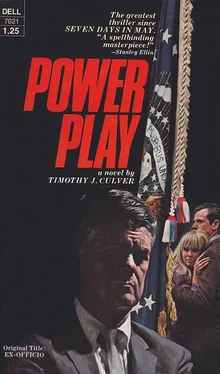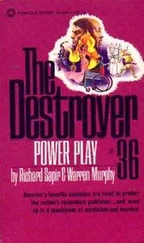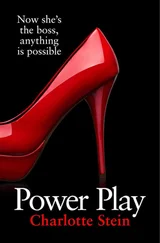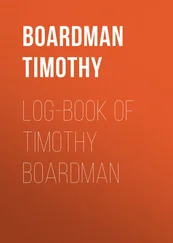They went out onto the blacktop, and a Chinese officer, an older man with no rifle in his hands, came forward to welcome Bradford, in heavily distorted English, to the People’s Republic. Bradford rose to the formality of the gesture — Evelyn was reminded again of the California trip, and how Bradford then had treated a small scattered disinterested crowd as though it were a mob of thousands — and when the officer apologized for the nature of the transport they were asking him to accept, Bradford assured him he understood the security problems involved in his arrival and would cooperate in every way he could. And then he got into the truck.
Evelyn hung back. She hung back so long that the smiling officer, his hand politely extended to assist her, began to look puzzled. “You are not feeling well?”
They mustn’t know what I really think, she told herself. There will still be something I can do, somewhere, sometime. “I’m fine,” she told the officer, and even managed a smile. “The trip has left me a little groggy, I think.”
“Yes, of course. Very comfortable quarters coming, I promise.”
“Thank you,” she said, and took his hand, and stepped up into the truck.
A kind of sofa was fixed on one side of the interior, so that anyone sitting on it would be facing sideways. There were no windows, but there was a dim light bulb in a fixture in the roof. Evelyn sat down beside Bradford, the door was closed from outside, and a second later the truck jolted forward.
Bradford put a hand on Evelyn’s forearm. “Don’t be nervous. They know we want to be their friends.”
“Yes,” she said.
They hadn’t been told how long the truck ride would take, but it was just an hour by Evelyn’s watch — from one-forty to two-forty, Eustace time — when the truck stopped, backed up, stopped again, and they heard the engine switch off.
Bradford too had started to get nervous as the truck had gone on and on; he hadn’t said anything, but Evelyn hadn’t needed words, she could tell by the way he sat hunched beside her, by the expression on his face in the dim light inside the truck.
But the instant the truck stopped he became cheerful and optimistic again, sitting up straighter, saying, “Well, here we are.” And the doors opened.
More Chinese soldiers, or perhaps the same ones. The same officer, in any case. He helped Evelyn out onto bare ground, and she looked around to see that they were in some sort of wooded area, but with a low pale building directly in front of them.
“This way,” the officer said, and Bradford took Evelyn’s arm and walked with her behind the officer as he led the way into the building.
Inside, it seemed to be virtually nothing but a fluorescent-lighted corridor, with rooms leading off it on one side only. All the doors were shut, but the officer opened one, and inside was a narrow elevator.
It was a tight squeeze for the three of them. There were several buttons, marked with Chinese characters.
The elevator took them down three levels, and stopped. The officer opened the door to show an identical corridor with the one above, except that this one had rooms on both sides. Again, all the doors were closed, and most of them were marked in Chinese.
“For now,” the officer said, “we think that you would both prefer an opportunity to rest. Wash, change clothes, perhaps sleep. Tomorrow is time to get started.”
“I agree,” Bradford said. “It’s been a grueling trip.”
“Yes.” The officer opened a door. “This is your suite. And Mrs. Canby across the way.”
“I think I’m ready for sleep,” Bradford said. “Evelyn? Unless you want to talk.”
“No, you sleep. I’m tired, too.”
“Then I’ll see you in the morning.”
“In the morning,” she agreed.
Bradford stood in the open doorway — past him she could see a pleasant-looking apartment, apparently several rooms in extent — and watched, smiling, as the officer opened the door across the hall and bowed for Evelyn to enter.
There was nothing else to do. “Thank you,” she said. She stepped into the room, the officer closed the door behind her, and Robert stood up from the chair in the corner and came toward her, smiling, arms outstretched.
She said, “What—”
“It’s all right now,” he told her, and put his arms around her, and held her close.
What is it? What’s happening?” Evelyn asked a hundred times, and every time Robert would only say, “Let Wellington tell you, not me. Let him tell you.” Then there was a knock at the door, and the Chinese officer entered to say, “It’s okay, he’s going to bed.”
“Come on,” Robert said. “I’ll take you to Wellington.”
She and Robert and the officer rode back up in the elevator to the ground floor, and along the corridor to one of the doors with Chinese lettering on it, and into a long room spartanly furnished with folding chairs and one wooden table, on which sat a tape recorder.
There were five men in the room: Wellington, standing behind the wooden table; Joe Holt, sitting beside James Fanshaw, the psychiatrist who was taking care of BJ; Howard; and her brother, George.
The room itself was amazingly rough-hewn. There were no interior walls at all, you could see the supporting two-by-fours on which the outer wall and the corridor wall were attached. The room was long, long enough to have four doorways to the corridor, but only the door they’d come in by was functional, the other three being nailed and propped into place. It was a fake of a room, as seen from backstage.
Evelyn said, “What is this place? Where am I?”
“The simplest way to explain,” Wellington said, “is to play you this tape.” And before she could protest, or ask a specific question, he had pushed a button on the machine and a voice said, “The contradiction that has plagued us is that we have to keep Bradford from traveling without him knowing he’s being kept from traveling. That’s an impossibility on the face of it.” The voice, she suddenly realized, was Wellington.
Another voice — Howard? — said, “Are you saying there is no answer?”
Wellington’s voice said, “No. I’m saying there is an answer, but it’s a difficult one, and an expensive one.”
Somebody, possibly Joe Holt, said, “I don’t think anyone here cares about the expense, that isn’t important.”
Wellington: “I hope you’re right. So here, in essence, is the plan. We intend to convince Bradford he already has traveled to Red China.”
Somebody: “That’s impossible.”
Somebody: “If you mean a kind of hypnosis, you can’t indefinitely—”
Wellington: “No, I don’t mean anything like that. I mean that Bradford has to be institutionalized, it boils down to that, he can’t be allowed to run loose. So what we have to do is convince him that the institution is in Red China.”
Joe Holt: “You mean create a fake environment of some kind?”
Wellington: “Create it, send Bradford traveling, convince him his travels have ended in Peking, and maintain the artificial environment for the rest of Bradford’s life.”
Wellington, in the flesh, reached out and pushed a button to cut off his recorded voice. “There was a long argument following that,” he said. “I won’t bore you with it. The point is, that discussion took place the day before Elizabeth’s funeral. I told everyone present what I wanted to construct, how much it would cost each of them right now, how much it would cost each of them annually, and how much we could get out of the government. I had to have an answer—”
Evelyn said, “From the government? You mean you haven’t kept this in the family.”
Читать дальше












